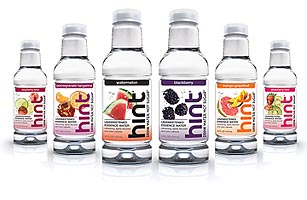
Hint Unsweetened Essence Water
Growing up, Kara Goldin's house was filled with the most recently released modern foods. But Ho Hos weren't snacked upon; they were studied. Stouffer's wasn't served; its ingredients were examined. A Twinkie sat on a shelf for observation. (It remained there, undecaying, for a year and a half.) Such was life as a daughter of Bill Keenan, a food exec who believed popular convenience foods could taste better and be better for you. He developed several alternatives, including the Healthy Choice line.
Fast forward a few decades later, when Goldin's daughter grabbed an increasingly popular unhealthy food choice — the sugared-up juice box. Goldin instantly knew what she had to do: invent her own line of great tasting healthier drinks.
Since starting Hint Water in her basement in 2004, and running the business from her dining room table and out of her garage, her offering, which contains no sugar, no preservatives, and no calories, has become a leader in an emerging category known as natural essence waters. While Goldin, a former AOL exec, now Hint's CEO, and her business partner and husband, Theo, a former attorney at Netscape and Hint's COO, originally targeted natural and specialty stores, the product is proving to have wider appeal. Today, the waters, flavored with extracts of watermelon, raspberry-lime, and more exotic blends like pomegranate-tangerine, are among the fastest growing of the flavored waters at Whole Foods and sold at mainstream markets, including Food Emporium, Stop & Shop, Sheetz convenience stores, and online sites like Amazon.com. Hint has made cameos on Grey's Anatomy, Boston Legal, and CSI and is the "official flavored water" on the Google campus. In March, Hint's blackberry flavor became available at Starbucks. "From a branding perspective, that is awesome," says David Karr co-founder of Guayaki Yerba Mate, a beverage company that also made the jump from the natural to mainstream. "It's huge for them, their biggest move yet."
It's been a refreshing year for Hint, thanks to its massive inroads in distribution and a new white label (replacing a transparent one) that made the product appear more prominent on store shelves. Hint has sold more water in the first half of 2010 than it did in all of 2009. The San Francisco-based company, which has 20 full-time employees, expects more than $15 million in wholesale revenue in the next year. While the Goldins initially financed the company themselves and still control it, Hint has also received funds from Verlinvest, the family fund of the descendants of the Stella Artois [Belgian beer] family, which owns approximately 26% of Anheuser-Busch InBev.
"Hint is a great product that is on its way to acceptance and I think it will be a huge success," says Ken Sadowsky, the senior beverage advisor at Verlinvest, and industry vet lauded for his beverage bets. (A former beverage distributor, he was one of the first to take on Snapple and Vitaminwater.) "There are converging trend lines — the acceptance that water is the healthiest choice, that people are bored to tears with water, the anti-childhood obesity campaigns — that make me believe we are on the verge [of something big]."
While the zeitgeist might be right for Hint, the beverage business is still known for its notoriously tricky waters. Slotting fees, or paying large sums of money to gain shelf space, is common, and a practice that is sometimes extended and abused my some supermarket managers. Despite repeated requests for gifts such as bikes or thousands in cash, the Goldins have never "paid to play." Nor have they given away product for free to open more doors. COO Theo says the decision may have limited Hint's exposure in the short term, but it helped maintain a premium price, which made the product more profitable to stores. "We are building a brand and every case counts," he says.